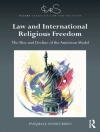This book explores the intercultural policy paradigm emerging within diversity and migration studies. Drawing on empirical studies of cultural diversity and placing a focus on the current crises of identity in Europe, Zapata-Barrero argues for an intercultural model of citizenship that prioritises contact between diverse people. In looking forward to a post-multicultural era, his analysis suggests how we can better manage the challenges presented by our increasingly complex, multifaceted societies.
This thoughtful text will appeal to students and scholars across politics, sociology, anthropology and social psychology, as well as policy makers and social entrepreneurs around the world grappling with issues around migration, diversity and citizenship.
Ricard Zapata-Barrero is a Full Professor of Political and Social Sciences at the Universitat Pompeu Fabra (Barcelona, Catalonia, Spain). He is also Director of the Interdisciplinary Research Group on Immigration at UPF, and Master in Migration Studies. He is member of the Board of Directors for IMISCOE and Chair of the External Affairs Committee. For information about publications, go to his webpage: www.upf.edu/web/ricard-zapata
Tabela de Conteúdo
Introduction: Citizenship and Diversity nexus revisited. The Intercultural Citizenship Focus
PART I: POST-MULTICULTURAL CONTEXT AND THE NEED OF A PRAGMATIC TURN IN DIVERSITY POLICY DEBATES
Chapter 1. The policy narrative context of diversity dynamics today
Chapter 2. Avenues of origin of intercultural citizenship: the European local turn in diversity policies
Chapter 3. Intercultural Turn in Europe: in a diverse Europe, what does ‘Europeanness’ mean today?
Chapter 4: The business card of intercultural citizenship: Distinctive features
PART II: FOUNDATIONS OF INTERCULTURAL CITIZENSHIP
Chapter 5. Conceptualizing an intercultural citizenship’s diversity-linkage theory
Chapter 6. Normative policy drivers of intercultural citizenship: a comprehensive view
Chapter 7. Republicanism, public space and intercultural citizenship
Chapter 8. The social benefits of intercultural citizenship: diversity as a public good
Concluding roadmap: summarizing what the reader has found in this book
References
Sobre o autor
Ricard Zapata-Barrero is a Full Professor of Political and Social Sciences at the Universitat Pompeu Fabra (Barcelona, Catalonia, Spain). He is also Director of the Interdisciplinary Research Group on Immigration at UPF, and Master in Migration Studies. He is member of the Board of Directors for IMISCOE and Chair of the External Affairs Committee. For information about publications, go to his webpage: https://www.upf.edu/web/ricard-zapata/












